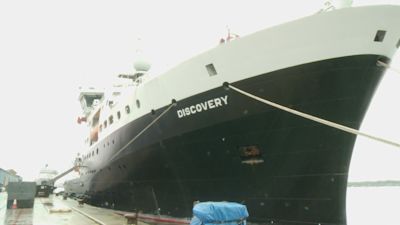NASA scientists head to Atlantic to investigate climate change on oceans

Watch: report by ITV News Meridian's Ravneet Nandra
A team of NASA scientists have set sail from Southampton for a month-long trip to the Atlantic to investigate how climate change is affecting our oceans.
The National Oceanography Centre has lent two ships as part of the expedition.
National Oceanography Centre has sent two of its ships and a number of scientists out to the North East Atlantic for a month-long expedition to support a global project led by NASA to assess the impact of climate change on the ocean.
It’s a huge global-scale project that will see NOC deploy a UK underwater glider which will remain onsite when RRS Discovery returns to Southampton.
The glider will repeatedly dive to 1000m making observations and once back in Southampton, the team will begin the task of converting their new observations and samples in to the hard data that are needed to study the changing Atlantic Ocean, climate regulation and ocean services, and to assess how the ocean will evolve as a result of climate change and intensified human exploitation.
David Siegel, Science Lead
Craig Lee, Chief Scientist
The two ships involved are the James Cook and the Discovery, based at Southampton Docks.
All 56 scientists quarantined in a hotel for 14 days on their arrival to Southampton, to make this expedition safe.
This particular expedition was scheduled for 2020, but was delayed due to the pandemic.
Guy Dale-Smith, Research Ship Manager
The NASA scientists approached the National Oceanography Centre to facilitate different services for the expedition, from ships or autonomous deployments, in order to undertake their work efficiently.
Scientists from America travelled to the UK to reduce the ships' carbon footprint, rather than travel to American on the ships.
Eleanor Darlington, National Oceanography Centre
Updates on the James Cook and the Discovery can be found here.